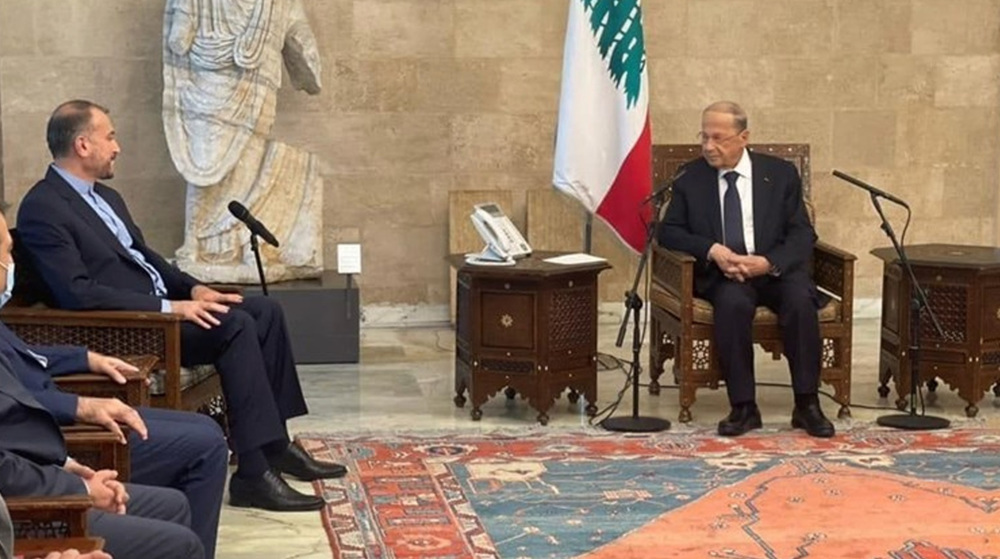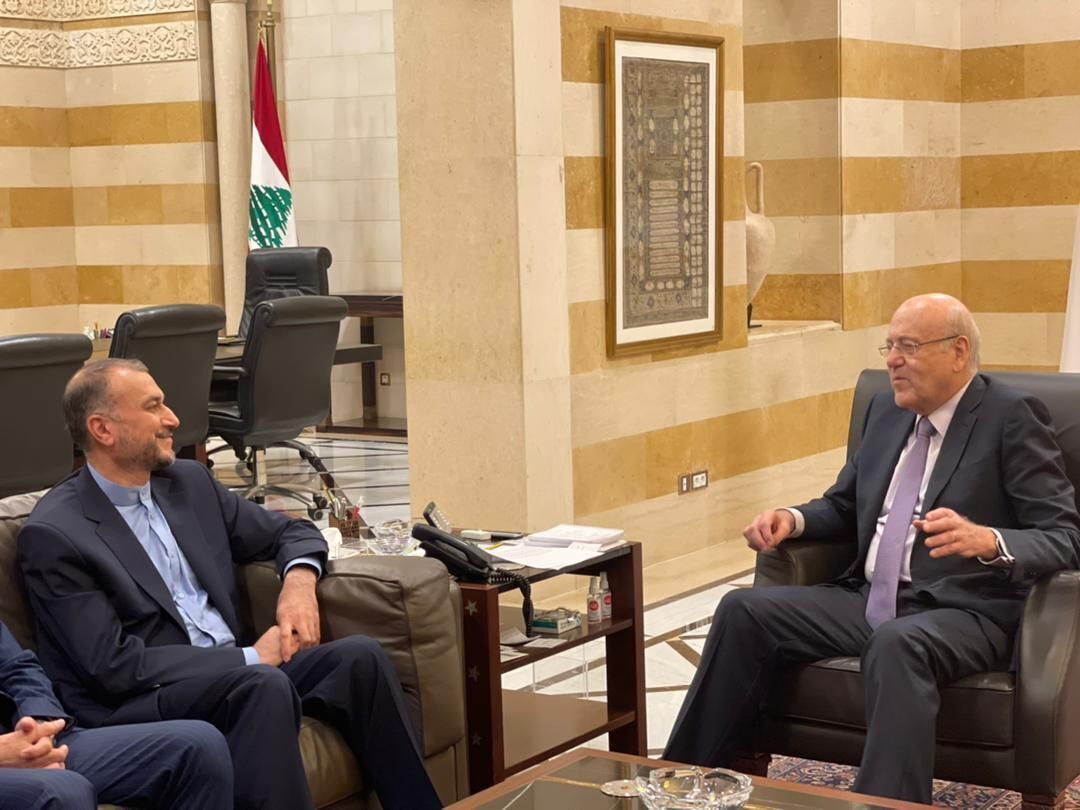Iran’s Foreign Minister Hussein Amir-Abdollahian in a highly important regional trip arrived in Beirut on Wednesday and held meetings with various Lebanese officials on Thursday and Friday.
The visit was at the center of political and media attention in the region as some actors were concerned about closer Iranian-Lebanese relations especially after Iran provided Lebanon with fuel that drew happiness of the Lebanese as it helped tacked the fuel shortage crisis amid an American-Arab pseudo-blockade on Beirut.
Many analysts agree that the warm reception of the Iranian FM demonstrated Tehran’s regional maneuvering power and the unbreakable bonds of the members of the Axis of Resistance in their cooperation to address challenges and conspiracies.
During his two-day visit, Amir-Abdollahian met officials like President Michel Aoun, Prime Minister Najib Mikati, and his counterpart Abdullah Bou Habib.
Amir-Abdollahian carrying peace, stability, and friendship to Beirut
The visit of the Iranian FM to Lebanon follows two very important developments in Lebanon, both of which are crucial in analyzing this visit.
First, after 13 months of political crisis and uncertainty in Beirut and the failure to form a cabinet amid widespread political divisions, Mikati managed to finally end the stalemate and form a new cabinet with a strong presence of Hezbollah.
Iran was one of the first regional and international parties to throw its backing behind the new government, and the Iranian FM is one of the first senior foreign official to visit Lebanon after cabinet formation, indicating Iran’s full support for the new cabinet’s efforts to beat off the challenges as economic crisis has already begun to bite.
On the other hand, Amir-Abdullahian’s visit took place after fuel shipments sent from Iran were able to reignite cars and power plants and fuel the normal flow of life in Lebanon after weeks of crisis.
The energy crisis in recent months has made it very difficult for the citizens to cope with the dire economic situation in Lebanon, which has disrupted the normal life in the gasoline-starved country.
In addition to the largely reliving fuel shipments, the FM flew to Beirut with good news: The readiness to build two power plants and also readiness to participate in reconstruction of Beirut port that was rocked by suspicious two explosions and was fully destroyed in August 2020.
The presence of the FM in Beirut, thus, carries the message to the people of Lebanon and the region of Iran’s support for stability and assistance to Beirut in resolving its political and economic challenges.
Mazen Ibrahim, chief of Al Jazeera’s office in Lebanon, commented on the agenda of the visit, saying that the top Iranian diplomat assured “through diplomatic language” that his country is ready to help Lebanon if necessary to overcome the current crisis.
The message is affirmed by the FM talking to the Lebanese officials about the advances of the Iranian-Saudi dialogue mediated by Baghdad, given the destructive Saudi role in Lebanon in the past years to challenge Hezbollah position in the country as part of a broader regional rivalry with the Axis of Resistance, a powerful bloc led by Iran and including Lebanon, Iraq, Syria, and Yemen.
Lebanon’s leaders are optimistic that Tehran-Riyadh de-escalation can positively reflect on the largely-critical Lebanese conditions.
Anti-Israeli alliance of Resistance members
There is another message, sent to the Israeli regime as a destabilizing factor in the region and a Lebanon’s neighbor. Terrified to see Tehran increasingly establishing a presence on its borders, Tel Aviv is watching the outcomes of the visit with extreme care.
READ ALSO: Israel: Palestinian ends 113-day hunger strike against ‘administrative detention’
During this visit, Amir-Abdullahian met with the leaders of the Palestinian factions like Palestinian Islamic Jihad as well as the Secretary-General of Hezbollah Sayyed Hassan Nasrallah and announced the continuation of Iran’s full support for their resistance against the Israeli regime.
These meetings reaffirm the unwavering bonds among the allies in the Resistance camp and the increase in coordination in line with the developments in the region and what is happening in the occupied Palestinian territories.
While Tel Aviv is striving for a toehold on the Iranian borders for a balance, the visit of the Iranian foreign policy chief to Beirut and his meetings with leaders of Lebanese and Palestinian resistant groups tightens the security encirclement of the Israeli regime.
Recall that, Prior to meeting with the Lebanese prime minister, Amirabdollahian met with the country’s president, parliament speaker and foreign minister.
During his meetings, the Iranian foreign minister voiced Tehran’s all-out support for Lebanon.
According to reports, Iran’s foreign minister said he discussed with officials in Beirut Thursday the “positive” effects of ongoing talks between Iran and Saudi Arabia, and blamed foreign troops based in the Middle East for regional instability.
Hossein Amir-Abdollahian is on his first visit to Lebanon since taking his post after Iran’s presidential elections this summer. He arrived in Beirut late Wednesday from Moscow. He said nuclear talks to revive Tehran’s now-tattered 2015 accord with world powers, stalled since June, will resume soon.
“We have positively evaluated the continuation of Iranian-Saudi negotiations,” Amir-Abdollahian told reporters after meeting Parliament Speaker Nabih Berri, referring to multiple rounds of discussions in Baghdad since the first direct talks between regional foes Riyadh and Tehran took place in early April.
The latest round was held late last month, according to Iraqi officials, marking the first such meeting between the two sides since a new president was sworn in in Tehran. Those at the meeting discussed “pending issues between the two countries according to a previously agreed on a roadmap, including diplomatic representation between the two countries,” according to one Iraqi official.
An improvement of relations between Iran and Saudi Arabia is likely to have positive effects in Lebanon, a small nation that has often served as a proxy battlefield for tensions between the two regional powers.














